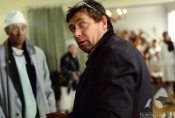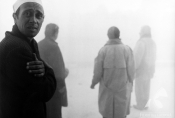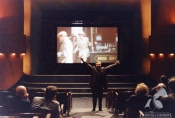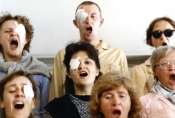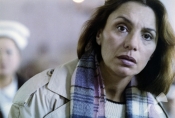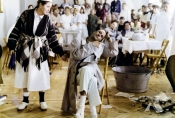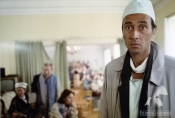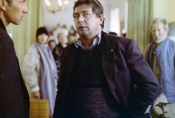ESCAPE FROM THE 'LIBERTY' CINEMA [1990]
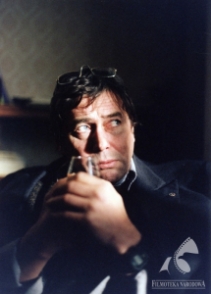
year:
- 1990
release date:
- 15 X 1990
runtime:
- 87 min
directed by:
- Wojciech Marczewski
written by:
- Wojciech Marczewski
director of photography:
- Jerzy Zieliński
cast:
- Janusz Gajos [Rabkiewicz, a censor], Zbigniew Zamachowski [censor’s assistant], Teresa Marczewska [Małgorzata in the film “The Dawn”], Piotr Fronczewski [sa Party Committee Secretary], Władysław Kowalski [Tadeusz, Małgorzata’s father in “The Dawn”], Michał Bajor [a film critic], Jan Peszek [Raskolnikow], Jerzy Bińczycki [Karwański, manager of the Liberty cinema], Artur Barciś [Krzysio], Maciej Kozłowski [an actor from the film “The Purple Rose of Cairo”], Henryk Bista [comrade Janik], Ewa Wencel [censor’s secretary], Krzysztof Wakuliński [Jerzy, Małgorzata’s husband in “The Dawn”], Krystyna Tkacz [a nurse in “The Dawn”], Ewa Wiśniewska [censor’s ex-wife], Artur Żmijewski [partner of the censor’s ex-wife]
edited by:
- Elżbieta Kurkowska
music by:
- Zygmunt Konieczny
production design:
- Andrzej Kowalczyk
produced by:
- Studio Filmowe „Tor”
executive producer:
- Andrzej Sołtysik
awards:
-
• Head of Cinematography Award 1991 for best director for Wojciech Marczewski, for best performance for Janusz Gajos, for best cinematography for Jerzy Zieliński
• Polish Feature Film Festival Gdynia 1990: Grand Prix Golden Lions, awards for best male performance in a leading role for Janusz Gajos, best score for Zygmunt Konieczny, Journalists’ Award, Award of the President of the Committee for Radio and Television
• Golden Reel 1991
• Golden Duck 1991
• SF Film Festival Avoriaz (France) 1992: The Grand Prix
• SF Film Festival Burgos (Spain) 1994: best film award, best performance award for Janusz Gajos
About the film
Janusz Gajos stands speechless in a dark movie theatre. A remarkable view stretches before his eyes. On the screen, defiant actors refuse to continue to play fake, idiotic roles. The audience members are trying to stop them with hysterical, panicked admonishments. These are the representatives of the official committee trying to drown their fear and helplessness. Another moment and Janusz Gajos starts laughing. "A moving scene reminiscent of ‘Master and Margarita’ by Bulgakov", critics have said.
Marczewski’s film contains many such sequences − eloquent just as they are dramatic. They make up a work that became an artistic sensation at the Polish Film Festival in Gdynia in 1990.It was awarded with the Grand Prix and the Journalists’ Award. The award for best male lead went to Janusz Gajos. Escape... was also awarded several more honours abroad, including the SF Film Festival in Avoriaz. Previous winners of the festival include: Carrie by Brian de Palma, Duel by Steven Spielberg and James Cameron's Terminator.
The fantastical element plays an important role in Marczewski’s film, though not in a manner typical to science fiction productions. It helps to show the spiritual transformation of the censor − once a poet and literary critic − currently (as the director describes him) a "run down" man, seemingly dangerous, but in fact terrorised and lonely. These two worlds: the real and the phantasmagoric, become intermingled. The censor crosses the border of the screen and enters into the film out of love for one of its heroines − Małgorzata − only to be disappointed however. He returns to reality, but he is no longer the same man. Once a poet, then a censor, now - what? One critic wrote: “In this film, everyone wants to get out of the framework of their own lives. The censor rebels. Film characters rebel. Everybody is looking for freedom which does not exist. A glimpse of it is perhaps only found in the idea of escape. One only has to go to the roof of his own house to see how many people are in a state of escape. "So many?", the censor is shocked, watching the roofs full of people. He is one of the sleep-walkers himself."
The Liberty cinema is screening the film The Dawn. The screening is interrupted by an extraordinary event. Actors come to life on the screen; they start talking to one another and engage the audience in their conversations. Crowds gather around the cinema, the relevant authorities and services are wondering what to do in such a complicated situation. A censor arrives, a man in his late forties, once a literary critic and journalist. The boundary between fiction and reality becomes blurred. The censor talks to one of the characters in the film – Małgorzata. She thanks him for the good review which he wrote many years ago, but she does not approve of what he is doing now. She makes him realise that the role of the censor is in fact the cause of his enslavement. The censor wants to stop doing what he has been doing. Policymakers decide to destroy their copy of The Dawn. In an act of protest, the censor enters the film, in order to prevent the burning of the copy.
www.filmpolski.pl
